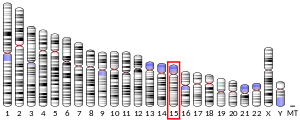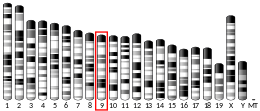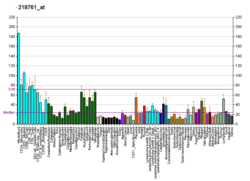RNF111
E3 ubiquitin-protein ligase Arkadia is an enzyme that in humans is encoded by the RNF111 gene.[5][6]
Function
The protein encoded by this gene contains a RING finger domain, a motif known to be involved in protein-protein and protein-DNA interactions. The mouse counterpart of this gene (Rnf111/arkadia) has been shown to genetically interact with the transforming growth factor (TGF) beta-like factor Nodal, and act as a modulator of the nodal signaling cascade, which is essential for the induction of mesoderm during embryonic development.[6]
Interactions
RNF111 has been shown to interact with Mothers against decapentaplegic homolog 7[7] and Mothers against decapentaplegic homolog 3.[7][8]
References
- GRCh38: Ensembl release 89: ENSG00000157450 - Ensembl, May 2017
- GRCm38: Ensembl release 89: ENSMUSG00000032217 - Ensembl, May 2017
- "Human PubMed Reference:". National Center for Biotechnology Information, U.S. National Library of Medicine.
- "Mouse PubMed Reference:". National Center for Biotechnology Information, U.S. National Library of Medicine.
- Episkopou V, Arkell R, Timmons PM, Walsh JJ, Andrew RL, Swan D (Apr 2001). "Induction of the mammalian node requires Arkadia function in the extraembryonic lineages". Nature. 410 (6830): 825–30. doi:10.1038/35071095. PMID 11298452.
- "Entrez Gene: RNF111 ring finger protein 111".
- Koinuma D, Shinozaki M, Komuro A, Goto K, Saitoh M, Hanyu A, Ebina M, Nukiwa T, Miyazawa K, Imamura T, Miyazono K (Dec 2003). "Arkadia amplifies TGF-beta superfamily signalling through degradation of Smad7". The EMBO Journal. 22 (24): 6458–70. doi:10.1093/emboj/cdg632. PMC 291827. PMID 14657019.
- Yuzawa H, Koinuma D, Maeda S, Yamamoto K, Miyazawa K, Imamura T (Jan 2009). "Arkadia represses the expression of myoblast differentiation markers through degradation of Ski and the Ski-bound Smad complex in C2C12 myoblasts". Bone. 44 (1): 53–60. doi:10.1016/j.bone.2008.09.013. PMID 18950738.
Further reading
- Patten I, Placzek M (Aug 2001). "Vertebrate development: Et in Arkadia". Current Biology. 11 (15): R616-9. doi:10.1016/S0960-9822(01)00367-0. PMID 11516970.
- Niederländer C, Walsh JJ, Episkopou V, Jones CM (Apr 2001). "Arkadia enhances nodal-related signalling to induce mesendoderm". Nature. 410 (6830): 830–4. doi:10.1038/35071103. PMID 11298453.
- Strausberg RL, Feingold EA, Grouse LH, Derge JG, Klausner RD, Collins FS, Wagner L, Shenmen CM, Schuler GD, Altschul SF, Zeeberg B, Buetow KH, Schaefer CF, Bhat NK, Hopkins RF, Jordan H, Moore T, Max SI, Wang J, Hsieh F, Diatchenko L, Marusina K, Farmer AA, Rubin GM, Hong L, Stapleton M, Soares MB, Bonaldo MF, Casavant TL, Scheetz TE, Brownstein MJ, Usdin TB, Toshiyuki S, Carninci P, Prange C, Raha SS, Loquellano NA, Peters GJ, Abramson RD, Mullahy SJ, Bosak SA, McEwan PJ, McKernan KJ, Malek JA, Gunaratne PH, Richards S, Worley KC, Hale S, Garcia AM, Gay LJ, Hulyk SW, Villalon DK, Muzny DM, Sodergren EJ, Lu X, Gibbs RA, Fahey J, Helton E, Ketteman M, Madan A, Rodrigues S, Sanchez A, Whiting M, Madan A, Young AC, Shevchenko Y, Bouffard GG, Blakesley RW, Touchman JW, Green ED, Dickson MC, Rodriguez AC, Grimwood J, Schmutz J, Myers RM, Butterfield YS, Krzywinski MI, Skalska U, Smailus DE, Schnerch A, Schein JE, Jones SJ, Marra MA (Dec 2002). "Generation and initial analysis of more than 15,000 full-length human and mouse cDNA sequences". Proceedings of the National Academy of Sciences of the United States of America. 99 (26): 16899–903. doi:10.1073/pnas.242603899. PMC 139241. PMID 12477932.
- Koinuma D, Shinozaki M, Komuro A, Goto K, Saitoh M, Hanyu A, Ebina M, Nukiwa T, Miyazawa K, Imamura T, Miyazono K (Dec 2003). "Arkadia amplifies TGF-beta superfamily signalling through degradation of Smad7". The EMBO Journal. 22 (24): 6458–70. doi:10.1093/emboj/cdg632. PMC 291827. PMID 14657019.
- Colland F, Jacq X, Trouplin V, Mougin C, Groizeleau C, Hamburger A, Meil A, Wojcik J, Legrain P, Gauthier JM (Jul 2004). "Functional proteomics mapping of a human signaling pathway". Genome Research. 14 (7): 1324–32. doi:10.1101/gr.2334104. PMC 442148. PMID 15231748.
- Rual JF, Venkatesan K, Hao T, Hirozane-Kishikawa T, Dricot A, Li N, Berriz GF, Gibbons FD, Dreze M, Ayivi-Guedehoussou N, Klitgord N, Simon C, Boxem M, Milstein S, Rosenberg J, Goldberg DS, Zhang LV, Wong SL, Franklin G, Li S, Albala JS, Lim J, Fraughton C, Llamosas E, Cevik S, Bex C, Lamesch P, Sikorski RS, Vandenhaute J, Zoghbi HY, Smolyar A, Bosak S, Sequerra R, Doucette-Stamm L, Cusick ME, Hill DE, Roth FP, Vidal M (Oct 2005). "Towards a proteome-scale map of the human protein-protein interaction network". Nature. 437 (7062): 1173–8. doi:10.1038/nature04209. PMID 16189514.
- Liu W, Rui H, Wang J, Lin S, He Y, Chen M, Li Q, Ye Z, Zhang S, Chan SC, Chen YG, Han J, Lin SC (Apr 2006). "Axin is a scaffold protein in TGF-beta signaling that promotes degradation of Smad7 by Arkadia". The EMBO Journal. 25 (8): 1646–58. doi:10.1038/sj.emboj.7601057. PMC 1440825. PMID 16601693.
- Nagano Y, Mavrakis KJ, Lee KL, Fujii T, Koinuma D, Sase H, Yuki K, Isogaya K, Saitoh M, Imamura T, Episkopou V, Miyazono K, Miyazawa K (Jul 2007). "Arkadia induces degradation of SnoN and c-Ski to enhance transforming growth factor-beta signaling". The Journal of Biological Chemistry. 282 (28): 20492–501. doi:10.1074/jbc.M701294200. PMID 17510063.
- Levy L, Howell M, Das D, Harkin S, Episkopou V, Hill CS (Sep 2007). "Arkadia activates Smad3/Smad4-dependent transcription by triggering signal-induced SnoN degradation". Molecular and Cellular Biology. 27 (17): 6068–83. doi:10.1128/MCB.00664-07. PMC 1952153. PMID 17591695.
This article is issued from Wikipedia. The text is licensed under Creative Commons - Attribution - Sharealike. Additional terms may apply for the media files.




